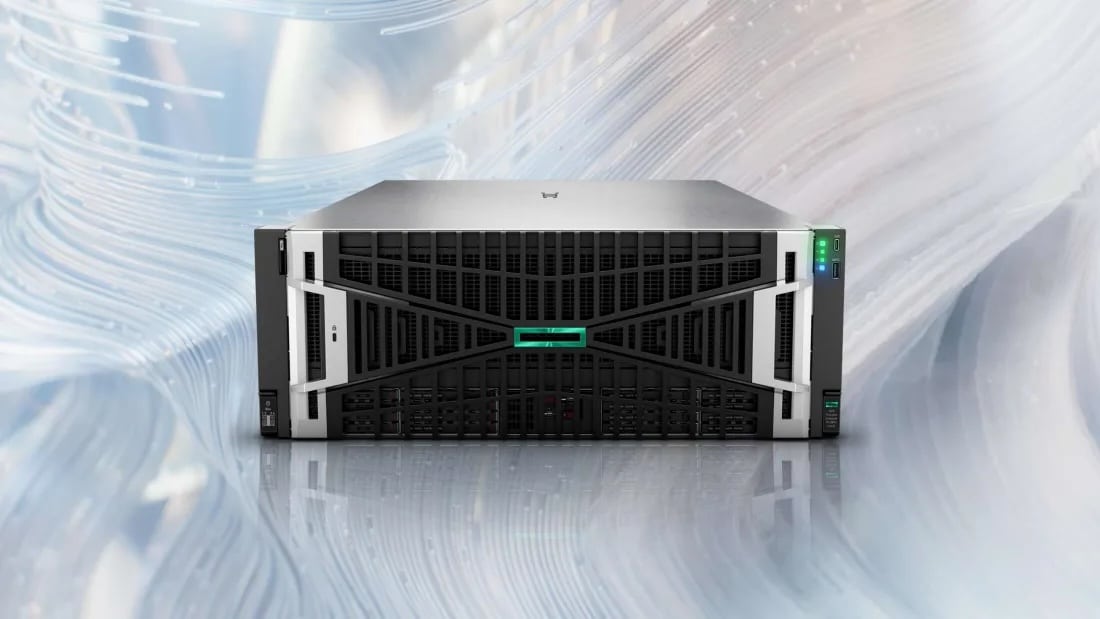Hewlett Packard Enterprise (HPE) and NVIDIA have taken a major step together to accelerate enterprise adoption of advanced artificial intelligence (AI). The Houston-based tech company announced significant enhancements to its NVIDIA AI Computing by HPE portfolio, including new HPE ProLiant servers optimized for NVIDIA Blackwell architecture and an upgraded version of HPE Private Cloud AI that incorporates NVIDIA’s latest AI models and blueprints for generative, agentic, and physical AI.
Released on August 11, 2025, this announcement reinforces HPE’s strategy to offer comprehensive solutions covering the entire AI lifecycle—from development to deployment—through deeper integration with NVIDIA AI Enterprise, enabling rapid and secure AI application deployment.
New HPE ProLiant Servers with NVIDIA Blackwell GPUs
The centerpiece of the announcement is the new HPE ProLiant Compute servers featuring NVIDIA RTX PRO 6000 Blackwell Server Edition GPUs, designed to meet the growing demands for accelerated data center computing.
There will be two key configurations:
HPE ProLiant DL385 Gen11
- 2U form factor RTX PRO Server, air-cooled.
- Supports up to two RTX PRO 6000 Blackwell GPUs.
- Ideal for companies seeking a balance between density and processing power for AI workloads.
HPE ProLiant Compute DL380a Gen12
- 4U form factor.
- Supports up to eight RTX PRO 6000 GPUs.
- Designed for environments requiring maximum compute capacity, from simulations to digital twins.
Both models feature multi-layer security with HPE’s Silicon Root of Trust and quantum-resistant encryption, along with automated management tools (HPE Compute Ops Management) that, according to the company, can reduce server administration hours by up to 75% and shorten unplanned downtime to 4.8 hours per server annually.
These servers are natural destinations for the most advanced AI workloads:
- Generative and agentic AI
- Physical AI for robotics and industry
- Visual computing (quality control, autonomous vehicles)
- Simulation, 3D modeling, and digital twins
- Critical enterprise applications
Private Cloud AI: The Enterprise AI Factory
Along with hardware updates, HPE introduced an upgraded version of HPE Private Cloud AI, a turnkey solution for deploying private AI environments co-developed with NVIDIA.
This new version will support:
- NVIDIA Nemotron reasoning models for agentic AI
- Cosmos Reason, a language and vision model (VLM) focused on physical AI and robotics
- NVIDIA Blueprint for Video Search and Summarization (VSS 2.4), enabling AI agents to analyze and summarize large volumes of video data
The platform leverages NVIDIA NIM microservices and seamless hardware-software integration, allowing organizations to deploy in hours what previously took weeks or months, all while maintaining full data control.
Senior HPE Vice President and General Manager of Private and Flexible Cloud Solutions Cheri Williams stated:
“Our collaboration with NVIDIA continues to push the boundaries of innovation, delivering solutions that unlock the value of generative, agentic, and physical AI while addressing the unique needs of enterprise workloads.”
NVIDIA’s VP of Enterprise AI, Justin Boitano, highlighted that pairing Blackwell GPUs with the new ProLiant 2U servers provides “a unified, enterprise-ready platform capable of accelerating virtually any workload.”
Data Security and Sovereignty
A key aspect of this offering is that HPE keeps data control and locality within private environments—a crucial factor amid regulations like the European GDPR and NIS2, as well as ongoing concerns around technological sovereignty.
HPE Private Cloud AI also provides:
- Seamless scalability across GPU generations
- Management in isolated (air-gapped) environments
- Support for multi-user enterprise environments
This approach aims to meet the rising demand for AI inference and production while safeguarding security and compliance.
Availability and Next Steps
- HPE ProLiant DL385 Gen11 and HPE ProLiant Compute DL380a Gen12 with Blackwell GPUs are available to order now and will begin shipping from September 2, 2025.
- Support for Nemotron, Cosmos Reason, and VSS 2.4 in HPE Private Cloud AI will arrive in the second half of 2025.
- The new generation of HPE Private Cloud AI with Blackwell support will also launch in the second half of 2025.
A Further Step in the Enterprise AI Race
With this launch, HPE and NVIDIA not only strengthen their partnership but also present a comprehensive offering that combines optimized hardware, cutting-edge software, and a deployment model designed for easy adoption of advanced AI without compromising security or control.
In a market where organizations aim to reduce deployment times, optimize resources, and protect intellectual property, this alliance provides a clear solution: flexible, scalable infrastructure tailored to real-world AI production needs.
Frequently Asked Questions (FAQ)
1. What is agentic AI, and how does HPE Private Cloud AI support it?
Agentic AI refers to systems capable of making decisions and taking actions autonomously based on predefined goals. HPE Private Cloud AI includes models like NVIDIA Nemotron that enable such applications, from virtual assistants to industrial automation.
2. What’s the difference between generative and physical AI?
Generative AI creates new content (text, images, code) from training data, whereas physical AI interacts with the real world—for example, in robotics, computer vision, or machinery control.
3. Why is NVIDIA Blackwell architecture important in these servers?
Blackwell offers significant improvements in performance, energy efficiency, and specialized AI computation, allowing larger and more complex models to run faster and with lower power consumption.
4. Can HPE Private Cloud AI integrate with existing company systems?
Yes. It’s designed for enterprise infrastructure integration, supporting multi-user environments and operating in isolated settings to meet security and privacy regulations.

